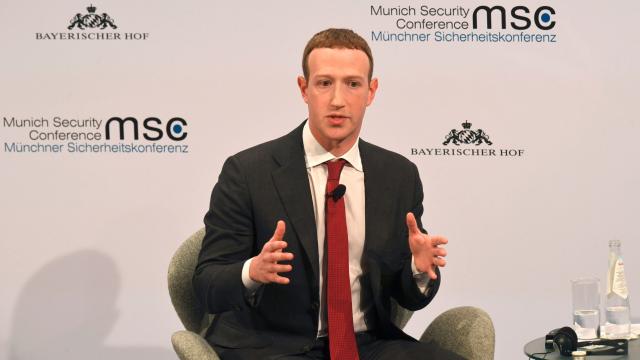Facebook CEO Mark Zuckerberg has pulled a massive 180 — at least on his public rhetoric — and said at a town hall meeting and Facebook post on Friday that the company will start affixing labels to or taking down posts from public figures like Donald Trump that violate its rules, as well as prohibit more categories of hate speech in ads.
Last month, Zuckerberg took to Fox News to explain that he wouldn’t intervene to stop Trump from posting baseless lies about Democratic voter fraud, proclaiming to conservatives that Facebook would not be the “arbiter of truth.” Just days later, Facebook contorted itself into an endless series of recursive thought loops to justify not removing a Trump post calling for the military to shoot protesters demonstrating against rampant racism in police departments and the police killing of Minneapolis man George Floyd.
Zuckerberg claimed that Trump’s use of the phrase “when the looting starts, the shooting starts” was merely a “troubling historical reference” as well as newsworthy, ignoring that it originated from an infamous Miami police chief that terrorised and sparked mayhem and violence in black communities in the 1960s. In early June, presumptive Democratic presidential nominee Joe Biden demanded Facebook stop letting politicians openly lie in ads. The company’s response was to distinguish itself from Twitter (which no longer runs candidate ads and has labelled Trump’s tweets) and cast its lack of action as a defence of “political speech, even when we strongly disagree with it.”
What’s changed? Over the past month, Facebook got a taste of the inevitable consequences of sucking up to the right when it removed Trump ads with Nazi iconography for political prisoners, and it faced withering criticism from its own workers. It also faced an advertising pseudo-boycott organised by the Stop Hate for Profit campaign that might not have seriously threatened the company’s bottom line, but it was, at the very least, a clear indication of the way the wind was blowing.
The changes announced by Zuckerberg on Friday included expanding its policy on election misinformation to prohibit posts found to be spreading hoax news that immigration officials are checking papers at voting places or threatening coordinated interference in elections. Facebook gets no points here for adding things that obviously should have been covered by its election rules in the first place. Another claim is that Facebook will increase its efforts to combat misinformation in the 72 hours before an election, which definitely won’t just be a rebranding of those useless election “war rooms” in 2018.
Others are more substantive: Zuckerberg said Facebook will now prohibit ads that assert people of a specific race, ethnicity, nationality, caste, gender, sexual orientation or immigration origin are threats to the physical safety or health of others. He also said the company will “better protect” migrants, refugees, and asylum seekers from ads that are generally bigoted against them. In theory, that throws out a huge swathe of Facebook ad tactics used by anti-immigrant scaremongers, including but not limited to Trump’s re-election campaign. In practice, whether this policy is effective will depend on whether Facebook continues its longstanding policy of insisting that obvious rules violations aren’t when it’s politically convenient to do so, or if enforcement is lax.
Facebook will now label when it is leaving rule-violating content up purely because it is “newsworthy,” according to Zuckerberg. He added that Facebook will “allow people to share this content to condemn it, just like we do with other problematic content, because this is an important part of how we discuss what’s acceptable in our society,” but they may be prompted that the content violates policies. (Facebook already attaches these kinds of dubiously effective modules to posts not from politicians.)
Finally, Zuckerberg said “there is no newsworthiness exemption to content that incites violence or suppresses voting,” even if a “politician or government official says it,” and that Facebook “will take that content down.” Uh-huh.
Civil rights groups that have been pressuring Facebook to take action reiterated that they would remain unimpressed unless Facebook actually enforces the new policies.
“While Zuckerberg’s affirmation that Facebook’s policy will reflect that there ‘is no newsworthy exemption for content that incites violence or suppresses voting,’ even when it comes from a politician, we need the company to act to remove — not just flag — anyone who engages in it,” Jessica J. González, the co-founder of coalition Change the Terms and co-CEO of Free Press, told Gizmodo in a statement via email.
“… A zero-tolerance policy for hateful activity, no matter who perpetuates it, must also include the removal of the more than 100 white supremacists who still have an active presence on Facebook,” González added. “In holding true to their promise, we look forward to a complete purge of these hate mongers and decisive action against any politician who encourages violence or spreads election misinformation.”
“Zuckerberg’s announcement reiterates things we thought they were already doing,” Centre for American Progress and Change the Terms co-founder Henry Fernandez added in the statement. “The exception is they plan to flag but keep up some dangerous content from elected officials. But they will continue to rapidly push out dangerous information from elected officials across their platform.”
Facebook’s “core business model relies on amplifying hateful content to drive engagement and ad dollars, and their platform is too big to manage,” Freedom From Facebook co-chairs Sarah Miller and David Segal told Gizmodo in a separate statement. “Until policymakers and enforcers break them up and prohibit them from making money from targeted advertising, we will be subject to an endless cycle of largely cosmetic changes, followed by new scandals and abuse.”
